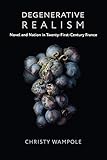Degenerative Realism : Novel and Nation in Twenty-First-Century France / Christy Wampole.
Material type: TextSeries: Literature NowPublisher: New York, NY : Columbia University Press, [2020]Copyright date: ©2020Description: 1 online resourceContent type:
TextSeries: Literature NowPublisher: New York, NY : Columbia University Press, [2020]Copyright date: ©2020Description: 1 online resourceContent type: - 9780231185165
- 9780231546034
- 843/.9209355 23
- PQ683 .W36 2020
- online - DeGruyter
| Item type | Current library | Call number | URL | Status | Notes | Barcode | |
|---|---|---|---|---|---|---|---|
 eBook
eBook
|
Biblioteca "Angelicum" Pont. Univ. S.Tommaso d'Aquino Nuvola online | online - DeGruyter (Browse shelf(Opens below)) | Online access | Not for loan (Accesso limitato) | Accesso per gli utenti autorizzati / Access for authorized users | (dgr)9780231546034 |
Frontmatter -- CONTENTS -- ACKNOWLEDGMENTS -- Introduction: What Is Degenerative Realism? -- 1. Demography and Survival in Twenty- First- Century France -- 2. Endarkenment from the Minitel to the Internet -- 3. Real- Time Realism, Part 1: Journalistic Immediacy -- 4. Real- Time Realism, Part 2: Le roman post- pamphlétaire -- Conclusion. Novel as Nation: Forms of Parallel Decay -- NOTES -- BIBLIOGRAPHY -- INDEX
restricted access online access with authorization star
http://purl.org/coar/access_right/c_16ec
A new strain of realism has emerged in France. The novels that embody it represent diverse fears—immigration and demographic change, radical Islam, feminism, new technologies, globalization, American capitalism, and the European Union—but these books, often best-sellers, share crucial affinities. In their dystopian visions, the collapse of France, Europe, and Western civilization is portrayed as all but certain and the literary mode of realism begins to break down. Above all, they depict a degenerative force whose effects on the nation and on reality itself can be felt.Examining key novels by Michel Houellebecq, Frédéric Beigbeder, Aurélien Bellanger, Yann Moix, and other French writers, Christy Wampole identifies and critiques this emergent tendency toward “degenerative realism.” She considers the ways these writers draw on social science, the New Journalism of the 1960s, political pamphlets, reportage, and social media to construct an atmosphere of disintegration and decline. Wampole maps how degenerative realist novels explore a world contaminated by conspiracy theories, mysticism, and misinformation, responding to the internet age’s confusion between fact and fiction with a lament for the loss of the real and an unrelenting emphasis on the role of the media in crafting reality. In a time of widespread populist anxieties over the perceived decline of the French nation, this book diagnoses the literary symptoms of today’s reactionary revival.
Mode of access: Internet via World Wide Web.
In English.
Description based on online resource; title from PDF title page (publisher's Web site, viewed 25. Jun 2024)


